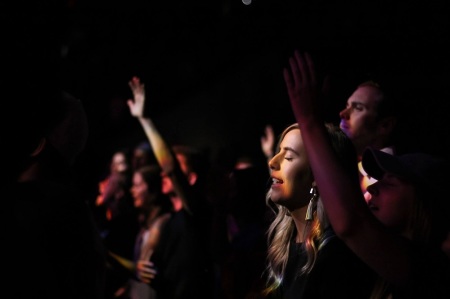Over a quarter of college and high school students 'never' attend church, new poll finds

A new poll suggests that nearly 30% of high school and college students “never” attended religious services even before the coronavirus pandemic caused many churches to cease in-person services.
Young America’s Foundation, a conservative youth advocacy organization, released a poll Wednesday asking young Americans for their views on various issues, including taxes, the economy, student debt, the coronavirus, education and the country’s most prominent political figures.
The poll, released in partnership with Townhall, was conducted by Echelon Insights. A total of 801 high school students and 819 post-secondary students between the ages of 13 and 24 were surveyed online from March 30 to April 7.
The survey asked respondents, “Before the COVID-19 pandemic, how often did you typically attend a religious service?”
Overall, 27% of respondents said that they “never” attend a religious service. Among high school students, 26% said they never attended a religious service, while that number rose to 28% among those out of high school.
Nearly one-quarter (24%) of young Americans said they attend church services at least once per week, including 28% of high school students. However, weekly religious attendance was significantly lower among post-high school students (19%).
About 14% of respondents claimed to attend church “once or twice” a month: 12% of high school students and 16% of post-high school students.
Meanwhile, 15% reported that they attend religious services “a few times a year,” while 12% said that they only participate in religious services on religious holidays.
Eight percent of respondents preferred not to disclose their frequency of religious attendance.
Among high school students, 15% said that they attend religious services a few times a year, 10% reported that they attend religious services only on religious holidays and 9% preferred not to say. Fifteen percent of post-high school students claimed to attend religious services a few times a year, while 14% said they only attend on religious holidays and 9% preferred not to say.
Additionally, nearly half of respondents (48%) declined to identify with a particular religion. About 16% responded that they “prefer not to say” when asked to describe their religion, 15% listed their religion as “something else,” 10% identified as atheists and 7% described themselves as agnostic.
A plurality of young Americans surveyed identified as Catholic (23%), followed by 14% who described themselves as Evangelical Protestant/Born-Again Christians and 6% who said they belong to the Church of Jesus Christ of Latter-Day Saints. Just 4% identified as Jewish. Small minorities of respondents described themselves as Mainline Protestants (3%) or Muslim (2%).
In an interview with The Christian Post, YAF spokesperson Kara Zupkus attributed the low religious attendance rates among young Americans to “a trend in our culture” where “a lot of younger people nowadays are … idolizing pop culture … [and] politicians.”
“So, they don’t really need to find, in their view, a place where they can worship a God,” Zupkus stated.
Describing the trend as “concerning,” Zupkus warned that it can lead to “younger people depending more on their government to take care of them” instead of their churches and local communities.
When asked how to reverse the trend of young Americans never attending church, Zupkus suggested that “a lot of it has to start in the family.”
“I think it’s important for parents to teach their children the importance of religion, to … have that community building. I think it’s important for kids to be exposed to that at a young age. And I think that that is a good way that we can ... turn that around,” she said.
“It’s a lot harder if children are growing up in a household where maybe religion isn’t as valued, and they don’t attend (church) regularly. Obviously, they’re probably not going to … once they go to high school, go off to college, they’re not going to continue or start. Or maybe it’s going to be a lot harder for them to start something new, a new tradition of going to church,” she added. “I think expanding different youth groups specifically in these different churches is going to be really important.”
Zupkus recalled her own experience in a youth group, noting that it “really inspired me and motivated me knowing that I had peers my age that were willing to learn more about religion and learn more about the faith.”
In light of the fact that pop culture “criticizes and demonizes religious people,” she emphasized the importance of “having peers to look up to,” which she said “can be an incentive and … help boost the confidence of those young people.”
Additionally, Zupkus advised churches to use social media to reach out to young Americans.
“I think if maybe churches engaged more with young people on social media and did more outreach that way, that could be a good way for them to help identify a local church in their area that they want to get involved with,” she said. “I know it probably can be pretty overwhelming for a brand new person to move to a brand new state, city, wherever they’re going for college and try and find a church and … feel welcomed.”
Zupkus contended that the low church attendance rates among young Americans have negative implications for political discourse in the U.S.
“The current climate in America with all the divisiveness and the hatred, it seems like, for other Americans, really does stem from this lack of religion,” she argued. “So, I think hopefully this poll kind of serves as a … warning light for Americans that we do need to … return to our roots and restore … faith in our young people. Hopefully, that will, in turn, lead to more healing and respect for other people’s opinions in politics.”






















